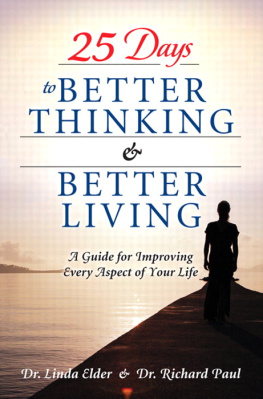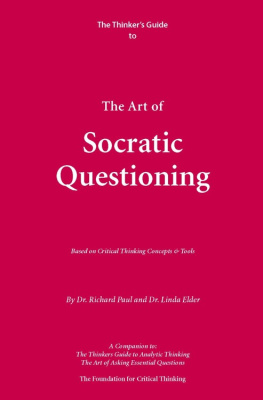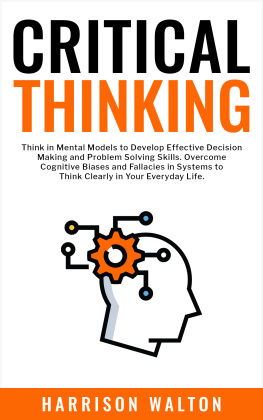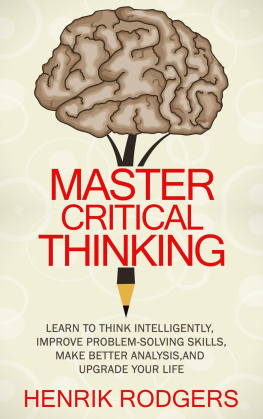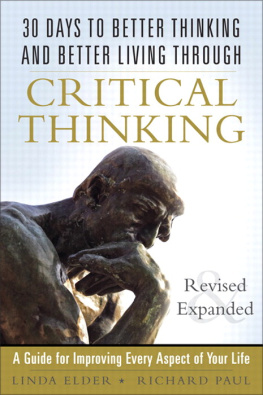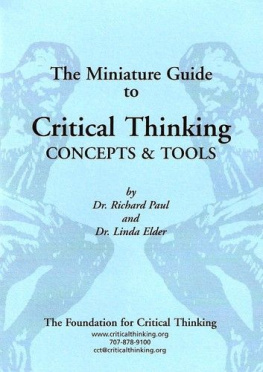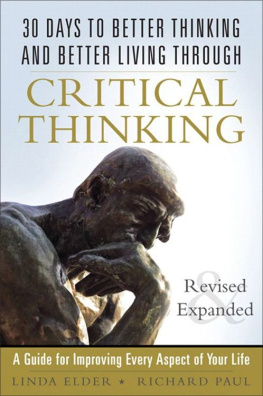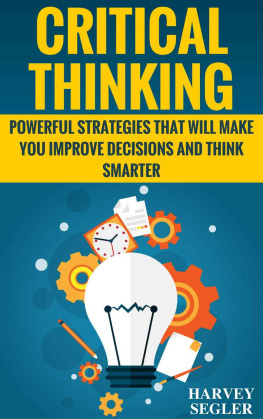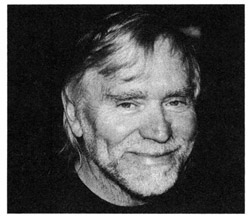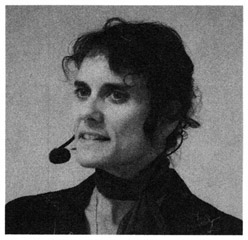Dr. Richard Paul is founder of the Foundation for Critical Thinking and director of research and professional development at the Center for Critical Thinking. He is an internationally recognized authority on critical thinking, with nine hooks and more than 200 articles on the subject. His views on critical thinking have been canvassed in the New York Times, Education Week, The Chronicle of Higher Education, American Teacher, Readers Digest, Educational Leadership, Newsweek, and U.S. News & World Report.
Dr. Linda Elder is an educational psychologist. executive director of the Center for Critical Thinking, and president of the Foundation for Critical Thinking. She is highly published and has a special interest in the relationship between cognition and effect, or thought and emotion. She has developed an original theory of the stages of critical thinking development. She is highly sought after as a speaker, and is a recognized leader in critical thinking.
The works of Linda Elder and Richard Paul have been translated into many languages including Spanish, French, German, Italian, Japanese, Polish, Chinese, Turkish, Creek, Thai, and Korean. The growing demand for translations into increasing numbers of languages testifies to the emerging international recognition of the importance of critical thinking in human life. And it is a testament to the contributions of Paul and Elder to the growing field of critical thinking studies.
The Foundation for Critical Thinking seeks to promote essential change in society through the cultivation of fairminded, or strong-sense, critical thinkingthinking predisposed toward intellectual empathy, intellectual humility, intellectual perseverance, intellectual integrity, and intellectual responsibility. In a world of accelerating change, intensifying complexity, and increasing danger, critical thinking is now a requirement for economic and social survival. Contact the Foundation for Critical Thinking at www.criticalthinking.org.
We wish to acknowledge our appreciation to Gerald Nosicha model of good sense, depth of vision, and unfailing friendship. His active commitment to the ideal of critical thinking extends beyond 30 years. He stands as living proof that humans can combine in one life reason, compassion, and justice.
The world is swiftly changing. With each passing day, the pace of life and change quickens. The pressure to respond intensifies. New global realities are rapidly working their way into the deepest structures of our lives: economic, social, cultural, political, and environmental realitiesrealities with profound implications for thinking and learning, business and politics, human rights, and human conflicts. These realities are becoming increasingly complex; many represent significant dangers and threats. And they all turn on the powerful dynamic of accelerating change.
Can we deal with incessant and accelerating change and complexity without revolutionizing our thinking? Traditionally, our thinking has been designed for routine, for habit, for automation and fixed procedure. We learned how to do our job, and then we used what we learned over and over. But the problems we now face, and will increasingly face, require a radically different form of thinkingthinking that is more complex, more adaptable. and more sensitive to divergent points of view. The world in which we now live requires that we continually relearn, that we routinely rethink our decisions, and that we regularly reevaluate the way we work and live. In short, there is a new world facing us, one in which the power of the mind to command itself, to regularly engage in self-analysis, will increasingly determine the quality of our work, the quality of our lives, and perhaps even, our very survival.
Consider a simple feature of daily life: drinking water from the tap. With the increase of pollution, the poisoning of ground water, the indirect and long-term negative consequences of even small amounts of any number of undesirable chemicals, how are we to judge whether or not our drinking water is safe? Increasingly, governments are making decisions about how many lives to risk based on the financial consequence of saving them, about whether, for example, to put less money into the improvement of water quality at increased risks to human health. How are we to know whether the risk the government is willing to take with our lives is in line with our willingness to be at risk? This is just one of hundreds of decisions that require us to think critically about the ever-more changing world we face.
Consider the revolution taking place in global communications. From e-mail to text-mssaging, from complex electronic marketing systems to systems that track us and penetrate our private lives, we are providing not only positive opportunities for people to be more efficient with their time, but also systems that render us vulnerable and wield power over us. On the one hand, we have networks w here goods, services, and ideas are freely exchanged with individuals the world over, and on the other hand, we face worldwide surveillance systems that render privacy an illusion. How are we to respond to these revolutionary changes? What are we to resist and what are we to support? When is a new system cost effective? Who should control it? For what ends should it be used? Who is to monitor its impact on human lives and well-being? How are we to preserve our traditional freedoms, at home and abroad? How are we to protect our families and ourselves? How are we to preserve our human rights and have lives of autonomy, security, and integrity? What are we willing to give up in the pursuit of greater convenience and ease of communication?
And while we ponder the many issues related to technological advancement, we must also juggle and judge work and child care, efficiency and clogged transportation systems, expensive cars and inconvenient office space, increased specialization and increasing obsolescence, increased state power and decreased civil freedoms.
We are caught up not only in an increasing swirl of challenges and decisions, hut in an increasingly threatening world as well:
A world in which we can no longer anticipate the knowledge or data we will need on the job, because we can no longer predict the kinds of jobs we will be doing.
A world in which powerful technologies are interfaced with simplistic thinking about complex issues: Get tough on crime! Three strikes and youre out! Zero tolerance! Adult crime, adult time!
A world in which national mass media gain more and more power over the minds of people.
A world in which the incarceration of more and more people for longer and longer periods of time is becoming one of the largest industries. employing hundreds of thousands of professionals with vested interests in maintaining a large prison population: builders, architects, lawyers, police, federal investigators, prosecutors, social workers, counselors, psychologists, prison guards, and others.
A world in which privacy is increasingly penetrated by multiple invasive technologies: face-recognition software, DNA testing, e-mail review systems, credit card tracking, and auto-tracking systems.
A world in which global forcessubject to virtually no controlmake far-reaching decisions that deeply impact our lives.


